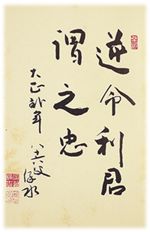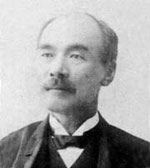“True loyalty is not unquestioning obedience to your master’s order, even if it is an order emanating from the state. If the order is contrary to the interests of the merchant house or the state that you serve, you should disobey it.” This favorite maxim of Saihei Hirose, Sumitomo’s first Director-General, originally appeared in Shuo Yuan, a Chinese classic known as the Garden of Stories, which also contains its obverse, “Obey your master’s order and make him sick. That is flattery.” Hirose’s conviction was that true loyalty, far from being the obsequious carrying out of orders, means raising objections to whatever is contrary to the interests of the house one serves.
Sumitomo has a long tradition of encouraging a vigorous exchange of views and listening attentively to people’s suggestions regardless of their positions in the hierarchy. The heads of the Sumitomo family respected this tradition. In 1828, Tomohiro, the ninth head of the family made this clear to the retainers: “At Sumitomo, regardless of age or rank, anyone with suggestions that they think may be useful for the house, should speak up. Even if your suggestion is not adopted, I will be grateful to you for your loyalty. So, do not hesitate to offer suggestions.” This was the culture in which Hirose embraced gyakumei rikun as his motto long before he became the first Director-General. In 1868, when executives at the Osaka head office insisted on selling the Besshi copper mine, Hirose, who was then the manager of the mine, vigorously objected. Only by engaging in a heated debate with the executives did he manage to stop the sale for the sake of the people working at the mine and for the sake of Sumitomo’s future. If Hirose had not raises an objection, the subsequent prosperity of Sumitomo may never have come to pass. Hirose practiced gyakushin rikun to further the interests of the house and the workers by expressing his opinion forthrightly to the executives, without trying to save his own neck.

 EN
EN
